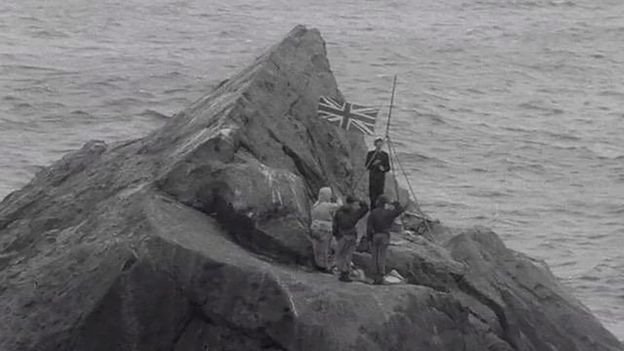
In 1955, annexation of Rockall was about ensuring national security. But within a few decades, the government became more concerned with securing rights to Rockall’s fish-rich waters, and the potentially vast oil reserves on the seabed. Ireland, Iceland and Denmark (acting on behalf of the Danish Faroe Islands) had begun staking rival claims to these lucrative waters. Keen to cement British ownership, Parliament voted to formally incorporate Rockall into the UK in 1972, making it part of Scotland’s Western Isles.
However, no other nation recognised the UK’s claim. A further blow came in 1982 when the UN Convention of the Seas was ratified, effectively preventing uninhabited rocks without an economy from being used as the basis for territorial claims. This meant that ownership of Rockall would no longer be decisive in the battle for oil rights to the seabed below.
Activists and adventurers on Rockall
It was a patriotic desire to reaffirm Britain’s claim to the islet that prompted former SAS soldier Tom McClean to set up camp on Rockall in 1985. He spent 40 days and nights there in a bid to prove the rock could sustain human habitation, living in what he described as a “wooden box” and becoming the first person known to reside on Rockall. When the UK first annexed the islet in 1955, “no other country was interested,” McClean told the BBC’s World at One. “It went on for about 10, 20 years and then oil started popping up and everybody was interested in Rockall.”
McClean would not be the only person to reside on Rockall with the aim of making a political statement. In June 1997, three Greenpeace activists landed by helicopter to claim Rockall as the capital of an entirely new micro-nation – “the Global State of Waveland” – in a stunt to protest against the government’s granting of mining licences in the region. Greenpeace said it wanted to “borrow” the islet until it was “freed from the threat of development”, offering citizenship of Waveland to anyone prepared to take their pledge of allegiance.
More like this:
• The CIA spy plane shot down over Russia in 1960
• The first men to conquer Everest’s ‘death zone’
• The greatest sailing rescue ever made
Activists spent a total of 42 days on the islet, beating McClean’s record. Shortly afterwards, the UK finally accepted that Rockall was, legally, a “rock”, when it acceded to the UN Convention of the Seas in July 1997. Overnight, the UK ceded fishing and mining rights to a 200-mile radius area around Rockall, prompting protests from fishermen angry at the loss of bountiful fishing grounds. Huge swathes of sea were defined as “international waters” and opened to negotiations between interested parties – debates that still rumble on today.
The Scottish Labour Peer Lord Kennet, a former seaman, said of Rockall: “There can be no place more desolate, more despairing, more awful to see in the world.” But that hasn’t stopped the lucrative waters around the islet being fought over by several nations – and the bleak outcrop continues to lure adventurers. One of them, Nick Hancock, survived on the rock for 43 days in 2014, setting a new world record. However, the unforgiving conditions have spelt disaster for others. In 2023, Army veteran Cam Cameron had to be rescued halfway through his own world-record attempt, after rough weather damaged his kit. “I don’t think there’s anything as terrifying as being on that rock – 300 miles from people, 200 miles from the nearest bit of land,” he told the BBC’s Sunday Show. “It was a lonely time.”








Recent Comments